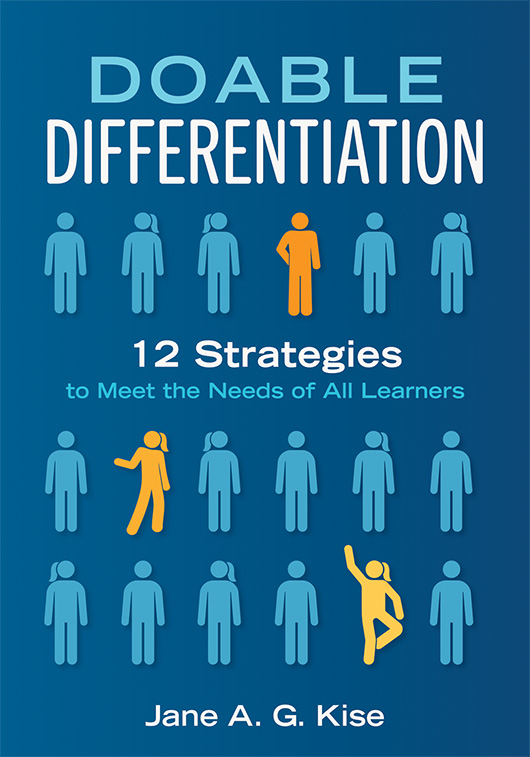Free Reproducibles
Doable Differentiation
Twelve Strategies to Meet the Needs of All Learners
Differentiating for students’ learning preferences can often seem too complex and complicated for too little gain. Learn a better way forward with the guidance of Doable Differentiation. Author Jane A.G. Kise provides a series of straightforward, high-reward strategies that K–12 educators like you successfully use in their daily practice to support, engage, and challenge students with diverse learning styles.
Benefits
- Understand the benefits of differentiation and how to implement differentiated instruction simply and effectively.
- Learn students’ preferred cognitive processing styles to better tailor differentiated lesson plans for all learners’ needs.
- Discover 12 categories of research-based differentiation strategies to implement immediately.
- Provide students with a variety of accessible options for processing information, engaging in higher-level thinking, and demonstrating learning.
- Engage learners and develop their proficiency and self-efficacy.
Table of Contents
Introduction: What Makes Differentiation Doable?
Chapter 1: Cognitive Processes and Effective Differentiation
Chapter 2: Clear Learning Goals and Expectations
Chapter 3: Choice
Chapter 4: Wait Time
Chapter 5: Unambiguous Instruction
Chapter 6: Pressure-Prompted Accommodations
Chapter 7: Student-Centered Discussions
Chapter 8: Curiosity Creators
Chapter 9: Open Questions
Chapter 10: Concept Maps
Chapter 11: Big Notes
Chapter 12: Moveable Organizers
Chapter 13: Planned
Chapter 14: Talking to Write
Chapter 15: Two-Step Differentiation
Epilogue
PRINTABLE REPRODUCIBLES
- Figure 1.1: The cognitive processing styles
- Figure 1.5: The cognitive processes and doable differentiation strategies
- Big Ideas in Early Mathematics
- Table 3.1: Motivating Word Pairs
- Figure 7.1: Sample sentence-starters poster
- Figure 7.2: Sample-prompts poster for primary students and English learners
- Tea Party Example Sentences
- Figure 9.2: Sample rubric for class evaluation of a discussion
- Figure 11.2: A four corners chart on big notes
- Figure 15.1: Original task rigor lesson plan
- Figure 15.4: Planning template for teaching around the cognitive processes
- Figure 15.5: Lesson plan for teaching around cognitive processes—Primary-grade example
- Figure I.1: The Elements of STEAM2
SUGGESTED RESOURCES
Books
- DuFour, R., DuFour, R., Eaker, R., Many, T., & Mattos, M. (2016). Learning by doing: A handbook for Professional Learning Communities at Work (3rd ed.). Bloomington, IN: Solution Tree Press.
- Fisher, D., Frey, N., & Lapp, D. (2012). Teaching students to read like detectives: Comprehending, analyzing, and discussing text. Bloomington, IN: Solution Tree Press.
- Fuller, A., & Fuller, L. (2021). Neurodevelopmental differentiation: Optimizing brain systems to maximize learning. Bloomington, IN: Solution Tree Press.
- Grift, G., & Major, C. (2020). Teachers as architects of learning: Twelve constructs to design and configure successful learning experiences (2nd ed.). Bloomington, IN: Solution Tree Press.
- Kise, J. A. G. (2019). Holistic leadership, thriving schools: Twelve lenses to balance priorities and serve the whole student. Bloomington, IN: Solution Tree Press.
- Kise, J. A. G., & Russell, B. (2010). Creating a coaching culture for professional learning communities. Bloomington, IN: Solution Tree Press.
- McTighe, J., & Curtis, G. (2019). Leading modern learning: A blueprint for vision-driven schools (2nd ed.). Bloomington, IN: Solution Tree Press.
- Sousa, D. A., & Tomlinson, C. A. (2018). Differentiation and the brain: How neuroscience supports the learner-friendly classroom (2nd ed.). Bloomington, IN: Solution Tree Press.
- Townsley, M., & Wear, N. L. (2020). Making grades matter: Standards-based grading in a secondary PLC at Work. Bloomington, IN: Solution Tree Press.
- White, K. (2019). Unlocked: Assessment as the key to everyday creativity in the classroom. Bloomington, IN: Solution Tree Press.
- Wiliam, D. (2011). Embedded formative assessment. Bloomington, IN: Solution Tree Press.
- Wiliam, D. (2018). Embedded formative assessment (2nd ed.). Bloomington, IN: Solution Tree Press.

